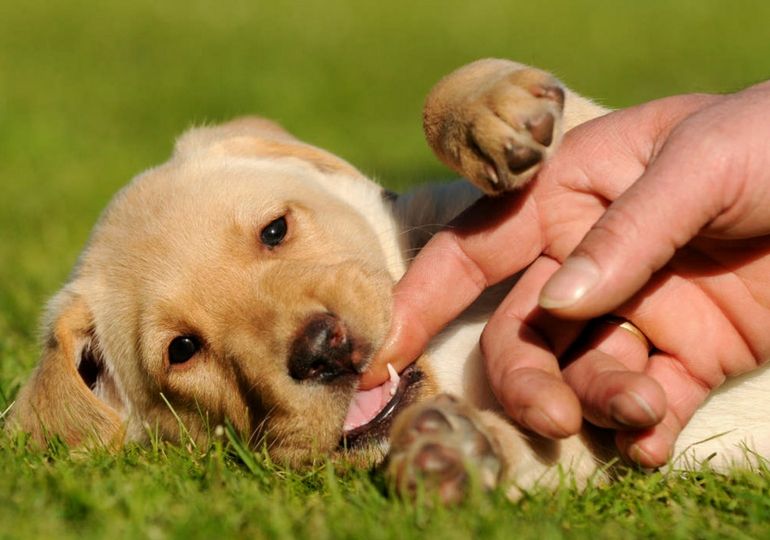When Does A Labrador Puppy Stop Teething

Teething is a necessary part of growing up for every puppy, and most dogs tolerate the process pretty well, Dr. Coates says. As a pet parent, you can help during this transition by providing appropriate dog toys, introducing dental health habits and watching out for signs of trouble.
When does a labrador puppy stop teething. Labrador retriever puppy image by crazy.nataly from Fotolia.com Like most mammals, your Lab puppy was born toothless. The rate at which pups grow their first teeth may vary slightly, but by the time you got your new Lab puppy, he was probably at least 6 weeks old and had his full set of milk teeth (properly called deciduous teeth). When will my puppy stop teething? Many puppies will be done with teething by about seven months and almost all puppies will have a full set of adult teeth at eight months old. A lot of people think that this phase will signal the end of the puppy chewing phase, but this isn’t necessarily the case. If you are new to the Labrador Retriever world and you have a new puppy, you may be wondering when Lab puppies finally calm down. First, for those that do not know, the Labrador Retriever breed is not for those that want to lay back on the couch and toss back a few beers. Introduction to puppy teething. Just like human babies, puppies are born with no teeth. Their first set of baby teeth, or milk teeth, grow in between 3 and 4 weeks of age. When your puppy is around 4-5 months old, these teeth will fall out to make room for their permanent set of adult teeth. By 5-7 months, all the adult teeth will be present.
How to Survive Puppy Teething. When your puppy is about three to four months old, his baby teeth will start shedding, making room for about 42 adult teeth to come in. By the time your dog reaches the 8-month milestone, all 42 of his permanent teeth should be in. Although actual teething may be finished, destructive chewing could be just hitting its stride. Your dog is now the equivalent of a teenager -- enough said. With some breeds, such as Labrador retrievers, the fun is just getting started. A teething puppy may whine for no apparent reason. Puppies in pain may become apathetic and less interested in playing. There may be a disruption of the puppy's digestive tract--the puppy's appetite may wane and bowel movements may become loose and watery. Teething starts in earnest at around 16 weeks. That is when the puppy teeth are gradually pushed out by the permanent adult teeth. By the age of 7 to 8 months, the pup should have all his teeth. Adult dogs normally have 42 permanent teeth. Teething causes pain and discomfort due to the pressure of the growing teeth, as they set in the gums.
Puppies start teething at 3-4 months old. With some exceptions, puppy biting will stop by the time your puppy has his full set of grown up teeth at 7 months. Puppies bite because they are teething, but they also bite in play. So we’ll look at both these issues. How To Stop Labrador Biting and Nipping. To stop your Labrador from biting, you must first recognize the reason behind this behavior. Stop Your Labrador Biting and Nipping When Teething. If your Labrador is teething then, this habit can be easily stopped with exercise and chewable toys. Ensure your puppy gets adequate exercise to burn his energy. Signs to Keep an Eye on During Teething . While it can vary somewhat between breeds, there is a progression you can expect as your puppy develops new teeth. It's important to begin handling your puppy's mouth while it's young so you can periodically check for any potential tooth problems. Any type of facial swelling, changes in eating habits, unexpected night awakenings, or rubbing of the face. We’ve compiled a puppy teething timeline so you know exactly what to expect as your furry friend grows into his adult body. Weeks 2 to 4: Your puppy will still be with his mother and breeder.
Problems in Labrador Puppy Teeth. There are lots of different problems your puppy can experience in conjunction with teething. Retained puppy teeth are the most common. The puppy tooth is considered retained if the adult tooth has emerged. The adult tooth does not have to be fully grown in order for the tooth to be considered retained. Puppies start teething at 3-4 months old. With some exceptions, puppy biting will stop by the time your puppy has his full set of grown up teeth at 7 months. Every Labrador puppy goes through teething differently and you just need to find the right tactic that works best for Penny. Brody wasn’t a big chewer,. Best to crate them when you cannot watch every second. The biting does stop after awhile. Be patient and give lots of love! Good luck! Lydia Cuellar Jones on Facebook March 26, 2013 . The puppy bites hard enough to cause pain, but does not break the skin; The puppy bites hard enough to break the skin. There could be additional levels of biting beyond five (the puppy tears the skin, the puppy repeatedly bites the skin, puncturing it, the puppy bites and shakes the hand, etc.).



















